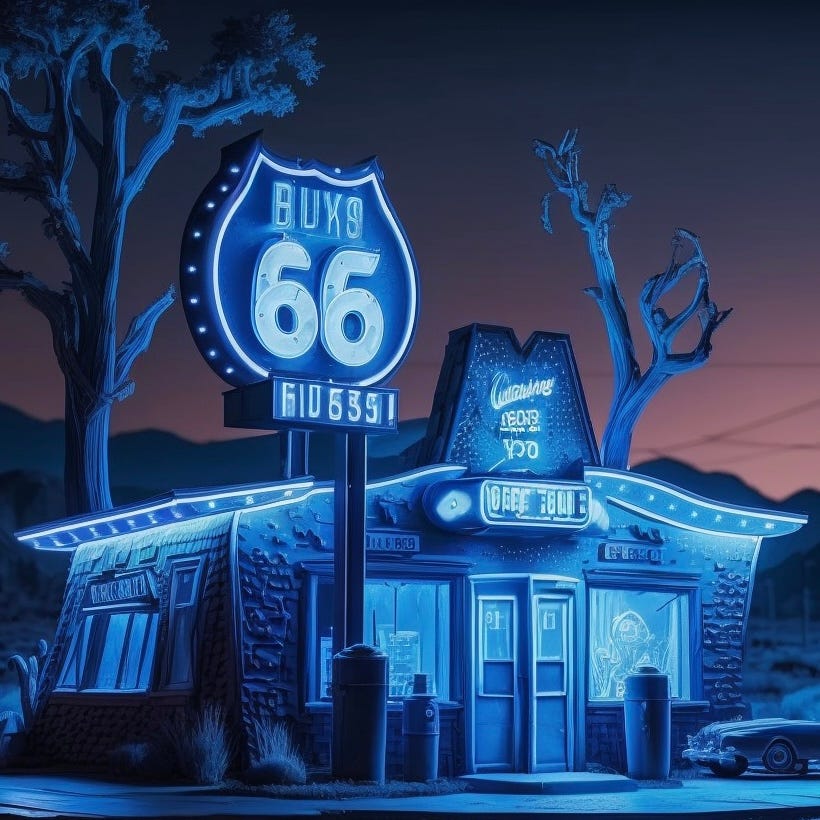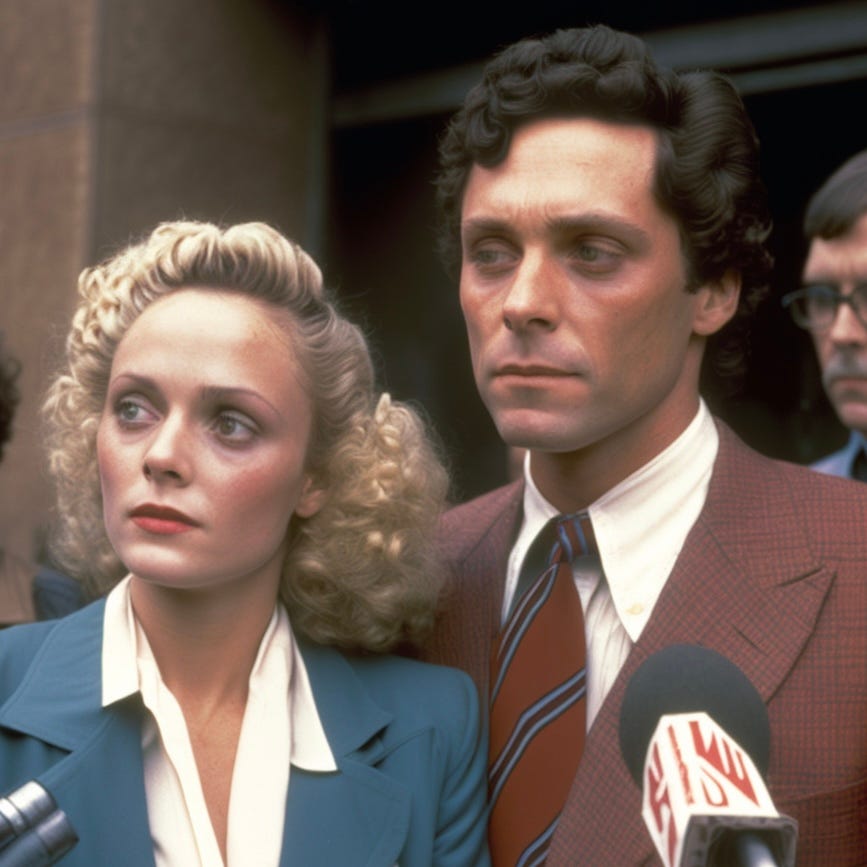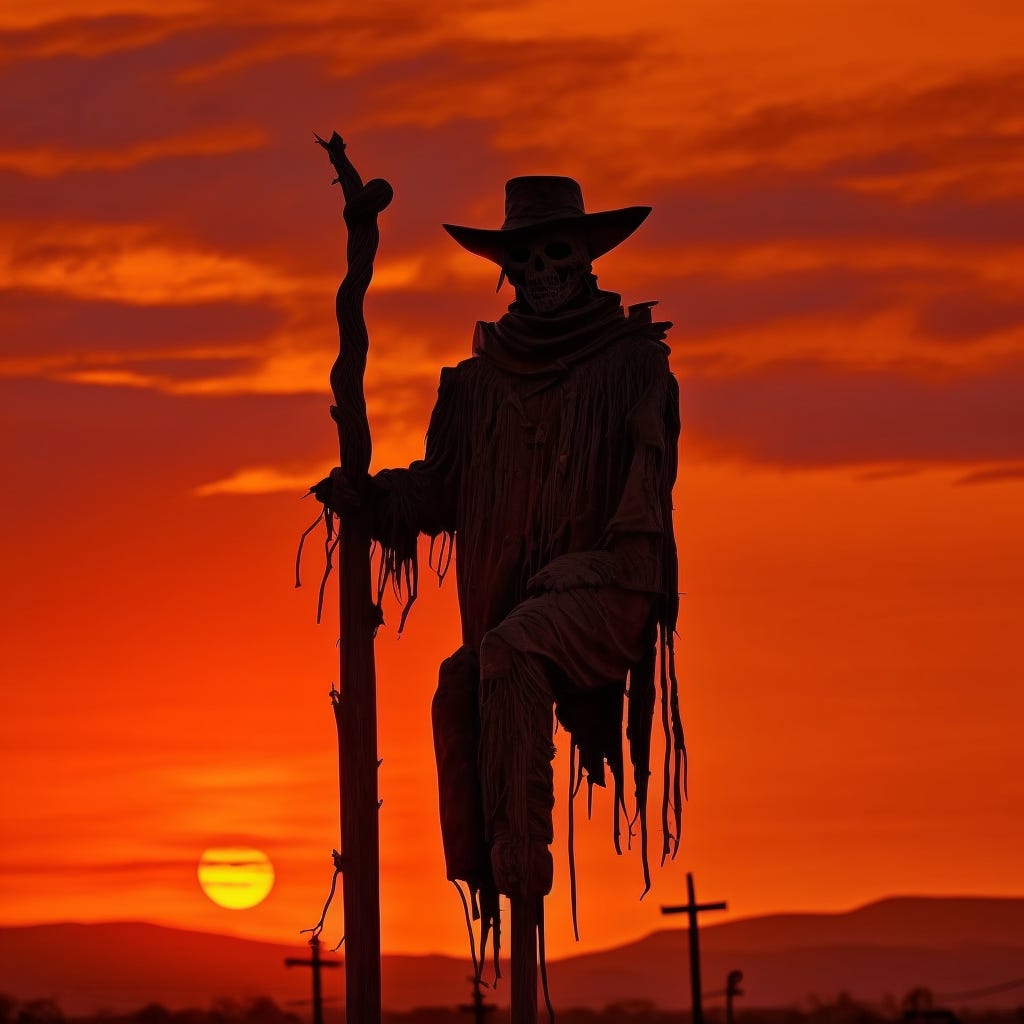If you’re joining us just now, follow the snake’s tail to the Prologue or climb a ladder to the Table of Contents.
Chapter 8: The Havasupai Man Who Runs the Gas Station on the Astral Plane
“We’re backstage,” Niyati told Evan. “And I don’t think we’re supposed to be here.”
The blue-white mist that had pervaded the university library in the Canadian Colony of Norway had followed them here. It cast an eerie glow on the black walls of the corridors, which were littered with broken stage equipment.
Niyayi led Evan through a maze of shredded furniture, splintered staircases on rollers, torn scenery. They passed spotlights on rusty stands—dented barn doors shading cracked glass. Broken ladders rose up to catwalks from which sparking wires dangled and writhed like hissing snakes. The air was stale and damp and there was a faint odor of manure. Rancid hay covered the floorboards. The clonk of a cowbell and the lowing of kine could be heard from behind the tattered backdrop of a farm.
All around them were the discarded props of vain and selfish actors, including the souls of their neglected children whom they had never wanted nor ever loved. They descended a ramp that led into a stuffy room crammed with thousands of costumes on clothings racks. They heard the passionate moans of clandestine venery that was taking place behind the rustling fabric.
They exited a door and stood on an empty set that was so realistic that the East River lapped against the shore and the real Brooklyn Bridge loomed overhead in the night. Sixteenth century Elizabethan slang was spray-painted on the concrete walls of the buildings that ran along the riverwalk. Everywhere there was graffiti depicting dark fairies with eyes that seemed alive. A low fire burned in an oil drum in front of an upraised pleather armchair. On the cushion of the armchair was a name plate indicating that the seat was reserved for Oberon.
Niyati realized they were on the set of an avant-garde production of A Midsummer Night’s Dream.
They walked over broken glass and around chunks of concrete and exposed rebar. Evan sprang up onto a loading dock and pulled Niyati up. The loading dock led into a warehouse on the waterfront. They were stood in a high-ceiled room lit only by the saline streetlamps outside.
“We’re in a film studio,” Evan said.
“How do you know?” Niyati asked.
“Last summer I did flat-top roofing at the studios in Burbank.” Then he shrugged. “But I dunno. . . Maybe it’s just a warehouse.”
No sooner had he said this, than four banks of overhead fluorescent lights came on: ca-thunk, ca-thunk, ca-thunk, ca-thunk. It was indeed a film studio and in the center of the wide room stood a structure surrounded by cameras and lights that looked like a lifesize claymation gas station. Then someone (or something) flipped a switch and the neon lights flickered on with a crackle and electric hum. A lightbulb popped and the letters on the gas station’s geometrically impossible sign kept spelling out gibberish—literally the word “gibberish”. The only thing that didn’t change on the sign was the number 66, which was actually 99 upside-down.
Evan walked toward the gas station but stopped just as he passed the director’s canvas chair. “Hey,” he said.
“What?” Niyati whispered. She looked over her shoulder toward the East River, because the fairies had flown out of the graffiti and were circling the oil drum. A horned man sat in the pleather chair, but his back was to her. She went to Evan’s side.
He removed his glasses. “I no longer need these!”
He tossed them to the ground and they clattered and slid across the floor and landed near a very real gas pump. The panicked face of Madame Blavatsky peered from both lenses. This was the only way she had been able to track Evan since leaving the library. But a force was dampening her ability to look into his dim-witted skull.
Someone struck a match, and from behind the gas station’s paper door a corona of light blossomed. Then the door became real door and opened, and out of it stepped one of the most powerful entities in the universe—the Havasupai man who runs the gas station on the Astral Plane. Not only was he the manager of every gas station in the universe that had ever existed and ever would, but he was the Lord and Master of all dreamers who transit the Astral Plane. His story was complicated, his motivations obscure.
It was he who had restored Evan’s 20/20 vision; and it was he who had damped Madame Blavatsky’s influence over him. The Havasupai man knew there was something important about Evan, and that the destiny of this universe and every unborn universe in non-existence hinged on helping the boy on his quest. It was for this reason that in the summer of 1979, the Havasupai man had told the German hippies in their collective dream that they would meet a man named Gordon.
“I need you to pass a message to him,” the Havasupai man said. “Tell him that a boy who is playing Snakes and Ladders with the girl he is destined to marry will arrive at LAX on 2 January 1994. The boy will be carrying an unborn universe in his right pocket. He will meet Gordon later that year and they will become friends.”
“Das ist groovy!” The hippies exclaimed.
“Genau (truly),” the Havasupai man replied. And then he continued to talk to them in German, which he had been speaking to them all along: “One more thing. When it’s time for you to leave the gold old U.S. of A., give Gordon your flower-power van. You won’t need it, but he will. Beside, he’s just a great guy.”
There was an unexpected consequence of the Havasupai man’s revealing these things to the German hippies. When they returned to Hamburg, they published an account of their collective dream and of their life-changing encounter with the Havasupai man who runs the gas station off Route 66 on the Astral Plane. The book was translated into thirty-four languages and became an international bestseller.
And that’s when the Havasupai man’s rather boring and quiet non-existence became complicated. Because now everyone wanted to consult the Havasupai man in their collective dreams: New Ageists from Winnipeg, celebrity psychics from Hollywood, aromatherapists from Seoul, homeopaths from Paris, twenty-something trust-funders from Santa Fe, with their blonde hair matted into dreadlocks and interwoven with yarn.—They all came a-callin’ to the Havasupai man, driving their dream convertibles, wood-paneled station-wagons, and beat-up winnebagos. They camped along the way and sang “Kumbaya” as they drove through the Mojave Desert or overnighted in the Badlands. And they discussed with one another the questions they would pose to the great sage.
Since money had no meaning on the Astral Plane, there was no reason for the dreamers to enter the gas station. For dream gas, like dream cannabis (and dream sex), was free and readily available; and the gas station’s toilets were located outside at the back—an added convenience for the nocturnal bedwetters. But this didn’t prevent the persistent dreamers from opening the gas station’s front door in an effort to gain the Havasupai man’s attention.
They usually had enough sense to realize that it would be rude to ask him point-blank to make a pronouncement—to say something wise. But what they didn’t know was that there was an unspoken rule in the universe that you just don’t talk to the Havasupai man unless he talks to you first.
So they fished for conversation starters, as they sidled (sandal-shod) toward the checkout counter, where the Havasupai man stood beside the cobwebbed cash-register, working on his crossword puzzles with a No. 2 pencil. He would refuse to look up, but would hear the clink of turquoise jewelry and smell the reek of hemp, essential oils, and homemade soap. The dreamers would clear their throats; and when their throat-clearings went unanswered, they’d say something fatuous and stupid, like, “It must be hard managing all the gas stations in the universe that have ever existed and ever will.”
“Not if you’ve got good people working for you,” the Havasupai man would say. And then he’d roll up his crossword puzzle and put his No. 2 pencil behind his ear and withdraw into the gas station’s back room, shutting the door behind him to let the dreamers know the interview had ended.
It wasn’t that the Havasupai man didn’t have wisdom to impart. How could he not, after managing every gas station in the universe that had ever existed and ever would? The problem was that, no matter what he might have told the dreamers, they would’ve twisted his words to their own ends (or the ends of others) until his original message had become lost in the blather.
But if the dreamers had looked a little less inward and a little more outward, and if they had focused less on the generalities of the world and more on its particulars, they might have learned a thing or two, and, in learning a thing or two, they might have hit upon a third, which was that they didn’t need a Havasupai man to impart wisdom to them. The great man himself didn’t think he was all that wise. He’d just seen a lot of shit over the centuries. And the more shit one saw the more wise one was accounted.
For example, there was the beloved Sikh father of three who managed the gas station on the Upper West Side of Manhattan. One night in the early 1980s, a coked-out yuppie crashed his sports-car into the gas station’s ice freezer. The yuppie was slumped over the wheel and had stopped breathing. The Sikh man ran outside and dragged the young man from the car. He administered mouth-to-mouth resuscitation, because this was seva, a selfless act that one performed with no expectation of reward.
The yuppie came to, sat up and blinked uncomprehendingly. He was still high and attacked his rescuer. In a manic fit, he strangled the Sikh man to death. But no sooner had he done this than something in him snapped, and he tried to revive the gentle man he’d just murdered. And as the cops pulled up, the yuppie wept and tore his hair, because he was starting to sober up, and he could sense that he had ruined his life. But the yuppie had money, and his lawyers convinced the judge that their client had been of unsound mind at the time of the crime, so he served four years and was released on probation.
And he stood on the courthouse steps and said, “I regret what I’ve done.” Then he faltered, and his lower lip quivered. “It should’ve me,” he whispered. Then his wife quickly leaned into the microphone and said, “Our children are just happy to have their father back again.”—And the Sikh man’s children watched the news segment from their aunt’s drafty tenement on the Lower East Side. They could tell the yuppie meant what he had said. So when he shot himself five months later, the Sikh man’s children attended the funeral to comfort the children of the man who’d murdered their father. Because that was seva, a selfless act that one performed with no expectation of reward.
The Havasupai man thought of Dharma and the fickle ways of Fate. And as he solved his crossword puzzles, he’d come across the clues for that 7-letter word JUSTICE, which could never be defined because its meaning always changed. He was reminded of the ignominious treaties imposed on the First Nations by the smiling politicians of the good old U.S. of A. And he thought of the octogenarian Ojibwe woman, Mama Margot Ashwiyaa, who ran the gas station on the outskirts of the Anishinaabe reservation in north-central Minnesota. She ran it jointly with that nice young boy who was fifty-five years old, whose name she could no longer remember.
And the reason Mama Margot couldn’t remember his name was because, ever since she was a little girl, her memories had been abandoning her. She realized she was losing her mind or had already lost it on the day she said, “That’ll be $12.46”—and when she looked up no one was there, and she was sitting at the plastic table in front of the donut case and coffee thermoses. She saw into the past more clearly than the present, and she knew that long ago she had been considered wise, and that she had never married or borne children because she’d consecrated herself to Christ.
Mama Margot suspected that she had become an insufferable bitch, because no one on the reservation seemed to want to be around her. And the more memories Mama Margot lost, the more insufferable she became, even to herself. But the nice young man who was fifty-five years old knew about her past and revered and respected her—so much so that he’d taken her into his trailer, where he fed her, made sure she took her medicine, and drove her to her doctors’ appointments. He’d taken over the day-to-day management of the gas station because he knew she couldn’t do that anymore. The young boy treated her like a saint, and Mama Margot knew all about the saints.
She’d been schooled by the nuns in the first two decades of the 20th century in that clapboard mission on edge of the reservation’s maple grove. The nuns complained to Margot’s parents that she daydreamed too much. But Margot wasn’t daydreaming. She was watching her memories as they abandoned her. They took on human forms and tearfully told her that even though they were leaving now, they would return when she died to guide her into the Hereafter. The nuns and priests were unaware that Margot’s relationship with the Big Guy was deeper and more profound than anything they could have ever aspired to.
One cold morning, as the snow fell on the maples, Margot drew a chalk drawing of Jesus Christ of the Sacred Heart. She drew it on her slate-board as the teacher taught them fractions. She’d drawn it because she knew that the Son of God was a midew (a medicine man), and that He knew the secret ways of the heart—because “secret” and “sacred” were from the same root. And she knew that the beard that Christ wore was a sacred disguise to conceal the secret Word.
When the nun saw the drawing, she said it looked clownish, inept, irreverent. She seized the slate-board and rubbed the image out. After class the nun sat across from Margot and lectured her, saying, “You drew that with your left hand. The Latin word for a left-handed person is sinister. Judas was left-handed. From now on you shall write with your right hand. And if I catch you writing with your left hand again, I’ll thrash you with a switch.”
And now, as Mama Margot sat at the plastic table in front of the donuts and coffee, she looked at her wrinkled right hand, the one that held the No. 2 pencil. And she thought of how she’d lost the ability to write or draw with her sinister left hand. All because of that mean old nun.
One time Mama Margot saw a news segment in which a psychologist explained that the surest way for an elderly person to keep their mind keen was to work on word puzzles. So she started doing word-searches, because they weren’t too hard. But she didn’t only search for the words in the clues. She sometimes circled letters in a zigzag fashion that spelled out words like RAGE and ANGER. And at other times she circled the letters that spelled out ANGUISH and GRIEF. And she wondered near the end why the world was so fixated on the written word, when it was the unwritten Word (with a capital “W”) that was the only word that mattered at all.
When she was fourteen a fat pink priest came to the school to instruct the children on spiritual matters, since nuns were women and women couldn’t comprehend such things. The priest talked about a recent publication called The Christ Myth, which he said was based on an ancient heresy called Docetism (Apparitionism), which claimed that Christ only seemed to be real, and that He had not died on the cross at all—but only seemed to die. And the priest sniffed and made it clear that he thought this was a crock of shit. But the sly young Margot covered her smile with her sinister left hand, because she alone in the classroom knew that the Docetists had gotten it right.
The great midew Jesus Christ had told his disciples that, in His Father’s lodge-house were many mansions and that He was going there to prepare a place for them. But he played a trick on the Romans and planted a scarecrow of himself on the fir-clad Mount of Golgotha. And the Lord cast a glamor over the scarecrow so the people thought Christ was nailed to a cross—and the scarecrow became the source and origin of all the false faiths and creeds that sprouted up around it.
Margot knew this was true because Christ himself had told her as the nun was erasing the image of Him from her slate-board—even as the Alzheimer’s was erasing the thoughts from her mind-slate now. “In my Father’s lodge-house are many mansions,” Christ whispered into Margot’s ear. “I go there to prepare a place for you.”
One day, as Mama Margot and the young boy who was fifty-five years old were closing up the gas station for the evening, a single mother from the reservation came in with her brood of four. Mama Margot was removing the last of the expired donuts from the bin.
“Do you want these?” she asked. And she held the tray of donuts down for the children. The kids took them and smiled up at Mama Margot, thanking her. And the single mother thanked her too. She said her kids hadn’t had donuts for awhile because she couldn’t afford them. And the mother paid for her gas and left.
The incident made Mama Margot feel something she hadn’t felt in a long time. She didn’t have a word for it—couldn’t find a word for it in the word-search puzzles. But seeing the smiles on the little kids’ faces had made her feel less like an insufferable bitch. And she realized that losing her mind wasn’t necessarily a bad thing if it meant regaining her humanity. So she told the young boy who was fifty-five years old that she had an idea and she wanted to run it by him.
“The bakery that delivers these donuts,” she said. “I wanna quadruple the order and quadruple it again. And I wanna have more donuts than we’ll be able to sell in a day. And when we close up, I’d like you to drive me around to the houses on the reservation where the families live who can’t afford donuts for their kids, and we’ll give them expired donuts as a gift, because I’m losing my mind and this feels like something I should do before I die.”
The young boy who worked for her, who was fifty-five years old, smiled and told her that buying that many donuts would cut into her profits, but he thought it was a good idea if it would make her happy. She said she wasn’t sure it would make her feel happy, but it would make her feel less like an insufferable bitch.
So every day after that when the gas station closed for the night, Mama Margot and the young boy took his truck and went door-to-door on the Anishinaabe reservation in north-central Minnesota on the planet Earth where the sun sets in the east, and they passed out donuts to the households with children whose parents couldn’t afford to buy donuts for them. And the households that didn’t get donuts didn’t seem to mind, because they got a kick out of seeing the old woman acting so charitable. And Mama Margot was confused when a woman her age, whom she’d never met before, hugged her and told her, “It’s good to have you back.”
On the day Mama Margot died, the same hanging cloud that had loomed over her house on the morning of her nativity rolled over the Anishinaabe reservation in north-central Minnesota. And the members of the tribe walked out of their homes because they knew this was it for Mama Margot.
The young boy who was fifty-five years old held Mama Margot in his arms and said, “If you’re ready to go, go. You don’t have to stay here anymore.” And when he said this, Mama Margot nodded and her spirit rose up out of the shriveled husk that the young boy drew to his breast. She floated up through the trailer’s ceiling and into the hanging cloud looming overhead.
She looked down and saw that everyone on the reservation had gathered outside the trailer where she had died, and that they were all looking up and waving at her. But the children she’d given donuts to were giggling and pointing behind Mama Margot, because there was something they wanted her to see. The old woman turned around—and there they were! All of her memories that had abandoned her over the course of her long life were returning to guide her to the Hereafter, just as they had promised they would do.
As they reintroduced themselves to her, they told her that they had only left her in the last three years, as the Alzheimer’s had gotten worse. Before that, she’d been as sharp as a tack. And she learned that she had been married: “And here I am, your loving husband,” her husband told her. “And the young boy who’s fifty-five years old is our youngest son. He kept trying early on to tell you who he was, but you’d get confused and snap at him, so he just stopped bringing it up.”
“I’m sorry I left you, Ma,” said her oldest boy who’d drunk himself to death in despair after Vietnam. And he stood shamefaced before her. But she took him in her arms and told him that all that mattered now was that he’d come back to her.
“We played a trick on you,” Mama Margot’s father said. “And we made you think we started leaving you when you were a little girl, but that wasn’t the case at.”
“In fact,” Mama Margot’s mother told her, “you were never really an insufferable bitch. You were kind-hearted and used to give the children donuts before the disease ravaged your mind, which was why your son, whose name is Makwa but who goes by Mac, was so happy you went back to giving donuts to the children—because it was just like old times.”
Mama Margot laughed and squeezed the hands of the memories that crowded round her, and she told them she didn’t mind that they’d played a trick on her in her final years—because she thought it was a pretty good joke.
Then Mac emerged from the trailer, and the woman who was Mama Margot’s age who’d told her it was good to have her back (and who was actually her sister) cried out in the ancient tongue and said, “Become who you always were!”
And Mama Margot Ashwiyaa (“She Who Walks Across the Hanging Cloud”) became the warrior-princess she had always been. And a Chippewa war song rose up from the reservation as she strode with her memories in a northwesterly direction toward the Canadian province of Manitoba.
As she passed over the still waters of the Lake of Galilee and espied through the mist a plume of smoke rising from the lodge-house of the Lord on the peaceful island in the middle of the lake, she turned to her memories and held up her sinister left hand to silence them, because there was a sacred secret that not even her memories knew.
And that was that, even though the great midew Jesus Christ had withdrawn to the island in the Lake of Galilee, He knew that if He stayed in the lodge-house, the seekers would find Him out. So in order to throw them off the scent, He’d withdrawn, not into the lodge-house itself, but into its reflection on the surface of the Lake of Galilee. So Mama Margot paddled her birchbark canoe through the white-water rapids in the same hanging cloud that had loomed over her house on the day of her nativity. And she steered the canoe into the mirror on the surface of the lake, guiding the prow toward the island where the lodge-house stood.
She dragged the canoe to the shore and stepped inside, and found herself in the backroom of the Havasupai man’s gas station off Route 66 on the Astral Plane. And the Havasupai man opened his chest and revealed His Sacred Heart—for the Lord God wears many masks. And even though it was an unwritten rule that you don’t talk to the Havasupai man unless he talks to you first, he’d been talking to Margot since she was child, so she felt no qualms about talking to him now, before he had a chance to open up his mouth and speak.
“Before I and my memories go off into the Hereafter,” she said, “I’ve come to give you some advice. First, you’re an old man and an important one. So it won’t do for you to lose your mind like I did. Keep it keen by doing word puzzles. I prefer the word-searches, because I don’t have to think too much when I do them.”
But the Havasupai man liked to think when he did word puzzles, so, even though he thought Mama Margot’s suggestion was a good one, he decided to do crossword puzzles instead, because searching for the Word when the Word was already before one’s eyes was not as poignant to him as calling the Word out of the darkness and making it flesh by way of answering the clues, hints, and prophecies that had prefigured its advent.
“And last but not least,” Mama Margot said, “if you want to stop the dreamers from finding you out, do what you did long ago. Hide here in the reflection of your Father’s lodge-house on the surface of the Lake of Galilee in the backroom of the gas station off Route 66 on the Astral Plane. And don’t say a word to the seekers. And when they no longer see or hear you, they’ll lose interest, and they’ll say to themselves that you must have been a myth all along.”
Then Mama Margot bade farewell to the midew Jesus Christ. She walked out of the lodge-house and pushed off her canoe. She paddled up and then out of the reflection in the water on the Lake of Galilee, and steered her canoe back up into the hanging cloud that had loomed over her house on the day of her nativity. And with her memories Mama Margot passed into the Hereafter, and forever passed away from the memory of men.
The Havasupai man withdrew into the reflection of his Father’s lodge-house on the surface of the Lake of Galilee in the backroom of the gas station off Route 66 on the Astral Plane. But to his dismay his withdrawal into silence and occultation was interpreted as itself a message from the Havasupai man. And the time of the drum circles and encampments began.
The dreamers made arrangements so that at least three of them were awake in the collective dream at any one time. They stood beside the cacti and acacias, patting their kneecaps and bellies, channeling the hidden vortices beneath Sedona, which they claimed linked up to a newfound vortex beneath the gas station on the Astral Plane.
When he could bear it no longer, the Havasupai man plucked a magic roadmap out of the rotating metal brochure rack that stood on the counter near the cobwebbed cash register. Then he opened the front door and went outside.
At once, the crowd fell silent.
“I have no wisdom to impart to you,” the Havasupai man said. “You came here predisposed to believe what you wanted to believe. And nothing I could ever say to you will change that. . . But I have a lot of work to do and you’re starting to get on my nerves.”
When he saw the sadness and bewilderment in their eyes, he softened his tone: “I know that most of you are well intentioned. But I need you to leave.” And then he whispered to himself, saying, “And this is the only way I know how to get rid of you.”
Then he unfurled his magic roadmap and held it high in the windless air. It looked to the observers like a rug of Havasupai weave. The collective dreamers gaped in wonder, for they knew he was a thaumaturge and they suspected he was about to perform a miracle.
The Havasupai man folded the roadmap in half. And when he did this, the entire dimension which he and the dreamers were standing on folded in half as well. The dreaming crowds and their encampments, their vehicles and drum circles, their shrines and tambourines, their Tarot cards and Atlantean crystals—all these things were folded up into the Havasupai man’s magic roadmap of Route 66. Then he folded the map into quarters and eighths, as the sun set in both the western and eastern horizon. And a bald eagle (which was actually the Holy Spirit in disguise) screeched across the blood-red sky as it flew over the empty desert.
But, even though the Havasupai man had folded the collective dreamers into his magic roadmap, they still dreamed they were encamped at that gas station on the Astral Plane. What’s more, the Havasupai man left a simulacrum of himself inside the map, a scarecrow that held a shaman’s staff. And it was the scarecrow that became the source and origin of all the false faiths and creeds that sprouted up around it.
The Havasupai man had only just put the roadmap back into the rotating metal brochure rack on the checkout counter next to the cobwebbed cash register, when he realized it was time to go back outside into the film studio where Evan and Niyati awaited him. Slowly he walked toward them. But when he got to Evan’s glasses near the gas pump, he stepped on them and crushed the lenses into sand.
The astral form of Madame Blavatsky flew out of the shattered lenses and into the air. Head over heels, she tumbled and rolled. Up and up, she rose and passed over the Havasupai man’s left shoulder. Then she drifted in the direction of the gas station until she got stuck in a dreamcatcher hanging near its front door. But this was no ordinary dreamcatcher. It was a dreamcatcher-catcher and could only catch other dreamcatchers on the Astral Plane, which is why it had nabbed Madame Blavatsky, who was the most notorious dream thief of them all.
But Madame Blavatsky and the Havasupai man both knew that the dreamcatcher-catcher couldn’t keep her for long.
“Come on,” Niyati said, pulling at Evan’s sleeve.
“Wait,” Evan said. “He’s obviously on our side!”
“Don’t say that!” she said.
Evan waved at the Havasupai man. “You’re on our side, right?!”
If there was one thing the Havasupai man hated more than anything else in the universe—more even than people talking to him before he had talked to them—it was when uppirty dreamers presumed to understand his mysterious and inscrutable motivations. So he flicked the ash from his cigarette and when he did this, the studio began to crumble and fall on Evan and Niyati.
They ran away as fast as they could, but Evan wheeled around and, through the rising dust, he saw the mica-like flash of the Ancient One’s eyes.
When they were gone, the Havasupai man blew out a stream of smoke. And he turned to the inert singularity that was lingering close by. “This kid of yours we’re supposed to help—he’s not too bright, is he?”
The singularity declined to respond.
The Havasupai man plucked a fleck of tobacco from his lower lip and said, “That’s what I thought.”
Then he went back to the gas station and opened the front door, which was the front door to every gas station in the universe that had ever existed and ever would.
—“The fuck’s his problem?!” Evan shouted, brushing dust from his scholar’s gown, which was torn and frayed.
“You just don’t talk to the Havasupai man unless he talks to you first.”
“Jesus Christ,” Evan grumbled.
“Precisely!” the emcee of the Astral Plane said, speaking directly to Evan as he turned his gray eyes to Niyati. Then he pointed to a dressing room door, and the name on the star read “Evan”.
“We’re about to go down a snake’s tail,” Nayati said. Then she opened the dressing room door and they stood on the brink of an abyss. The cackling of hyenas rose up from the darkness below.
















Great chapter! Docetism and the mythology of the scarecrow sound fascinating. I've never heard of it before, but I suppose it makes sense that, among all the various sects, someone would ask that question.
Both my parents went to Catholic school and I've heard many stories about the nuns. My dad is a "sinister" lefty and they tried to force him to write with his right hand. It didn't take, but he said they weren't shy about corporal punishment... and copious amounts of holy water were spilled ;-)
sparking wires dangled and writhed like hissing snakes - 💥. The cackling of hyenas rose up from the darkness below - does Twitter perchance feature in the next chapter?